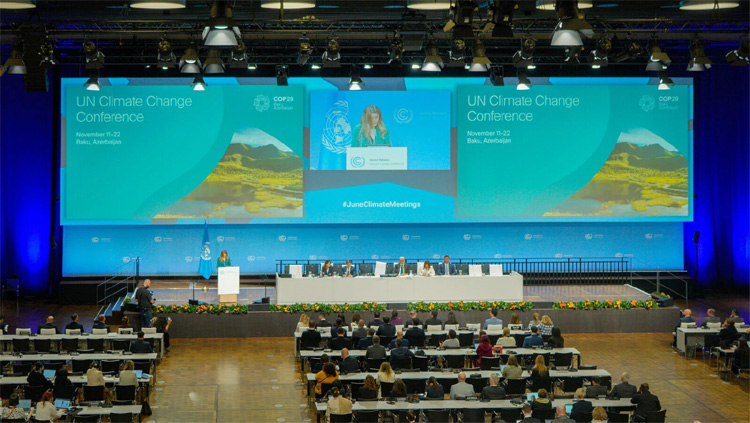With fewer than 100 days to COP29, what’s on the agenda?
The 100-day countdown to global climate conference COP29 began 3 August. The conference, scheduled for this November in Baku, is a key moment for leaders to make progress on climate commitments.
Recently, COP29 President-Designate Mukhtar Babayev sent his first official letter to the conference’s parties and constituencies. In it, he outlined the priorities for action — as well as the remaining hurdles to achieving them.
As his letter makes clear, we will need “all hands on deck” to successfully advance the event’s two “pillars”: the enhancement of ambition; and the enabling of action.
Here’s what’s on the agenda — and what’s needed to move these priorities forward.
What are COP summits?
The Conference of the Parties (COP) is the group of nations that have signed the UN Framework Convention on Climate Change (UNFCCC), which was put together in 1992. It commits them to act together to stabilize greenhouse gas concentrations “at a level that would prevent dangerous anthropogenic (human-induced) interference with the climate system”. Since then the Parties, or nations, have met almost annually.
The most recent COP, COP28, was held last year in Dubai and was the largest attended climate COP in history, convening 97,000 delegates, and more than 150 heads of state, along with negotiators, business leaders and non-state actors. The conclusion of the first ever Global Stock Take (GST) (a mid-term review of progress towards the 2015 Paris Agreement) was the event’s key outcome and the conference emphasized the need for determined action to make progress on renewable energy, a just transition and more.
Major priorities for COP29
1. Climate finance and “the NCQG problem”
Many are calling COP29 the “finance COP”, seeing it as an opportunity to align climate finance contributions with estimated global needs. Yet despite this focus on unleashing funds, nearly every basic element of the New Collective Quantified Goal (NCQG) is still being contested, from the new target and the contributor base to the scope of the finance involved and the Paris Agreement articles in question. Over the next few months, attention will need to be focused on creative solutions to these issues.
In addition, the private sector’s involvement needs to be ramped up; at the moment, many climate finance schemes have been devised by making assumptions about the behaviour of private capital, some of which have not held. The private sector is best placed to lay out the prerequisites for private finance to flow, so its input should be solicited quickly and systematically.
2. Article 6: Fixing a sputtering engine for capital mobilization
In recent years, carbon markets have become a flashpoint in international climate policy, largely because of their mixed results. On the one hand, they have shown potential as a debt-free way to channel finance from heavy emitters to promising clean or green projects. On the other, a lack of rigour has meant that often, carbon markets do not drive real emissions reductions, instead pushing funds into unneeded or unverifiable places and enabling greenwashing.
Article 6 of the Paris Agreement created principles for carbon markets and ways countries could cooperate to reach climate targets. While rules were agreed to at COP26, negotiation has been needed to establish the necessary guidance to operationalise it.
A fully operationalized Article 6 would provide the basis for better quality carbon markets through reviewable bilateral agreements and a centralized multilateral marketplace. To get to that point, negotiators need to come to agreements on definition and content; project eligibility and review processes; and the ability to make certain information confidential, among other issues.
Two successive COPs have failed to get Article 6 up and running, with countries and other entities striking some agreements in the meantime but no real scale being achieved. As anti-greenwashing sentiment continues to rise and companies back away from banner climate pledges, a well-functioning carbon market ensconced within the UNFCCC machinery is more important than ever.
In addition, the private sector’s involvement needs to be ramped up; at the moment, many climate finance schemes have been devised by making assumptions about the behaviour of private capital, some of which have not held. The private sector is best placed to lay out the prerequisites for private finance to flow, so its input should be solicited quickly and systematically.
2. Article 6: Fixing a sputtering engine for capital mobilization
In recent years, carbon markets have become a flashpoint in international climate policy, largely because of their mixed results. On the one hand, they have shown potential as a debt-free way to channel finance from heavy emitters to promising clean or green projects. On the other, a lack of rigour has meant that often, carbon markets do not drive real emissions reductions, instead pushing funds into unneeded or unverifiable places and enabling greenwashing.
Article 6 of the Paris Agreement created principles for carbon markets and ways countries could cooperate to reach climate targets. While rules were agreed to at COP26, negotiation has been needed to establish the necessary guidance to operationalise it.
A fully operationalized Article 6 would provide the basis for better quality carbon markets through reviewable bilateral agreements and a centralized multilateral marketplace. To get to that point, negotiators need to come to agreements on definition and content; project eligibility and review processes; and the ability to make certain information confidential, among other issues.
Two successive COPs have failed to get Article 6 up and running, with countries and other entities striking some agreements in the meantime but no real scale being achieved. As anti-greenwashing sentiment continues to rise and companies back away from banner climate pledges, a well-functioning carbon market ensconced within the UNFCCC machinery is more important than ever.


Comments are closed.